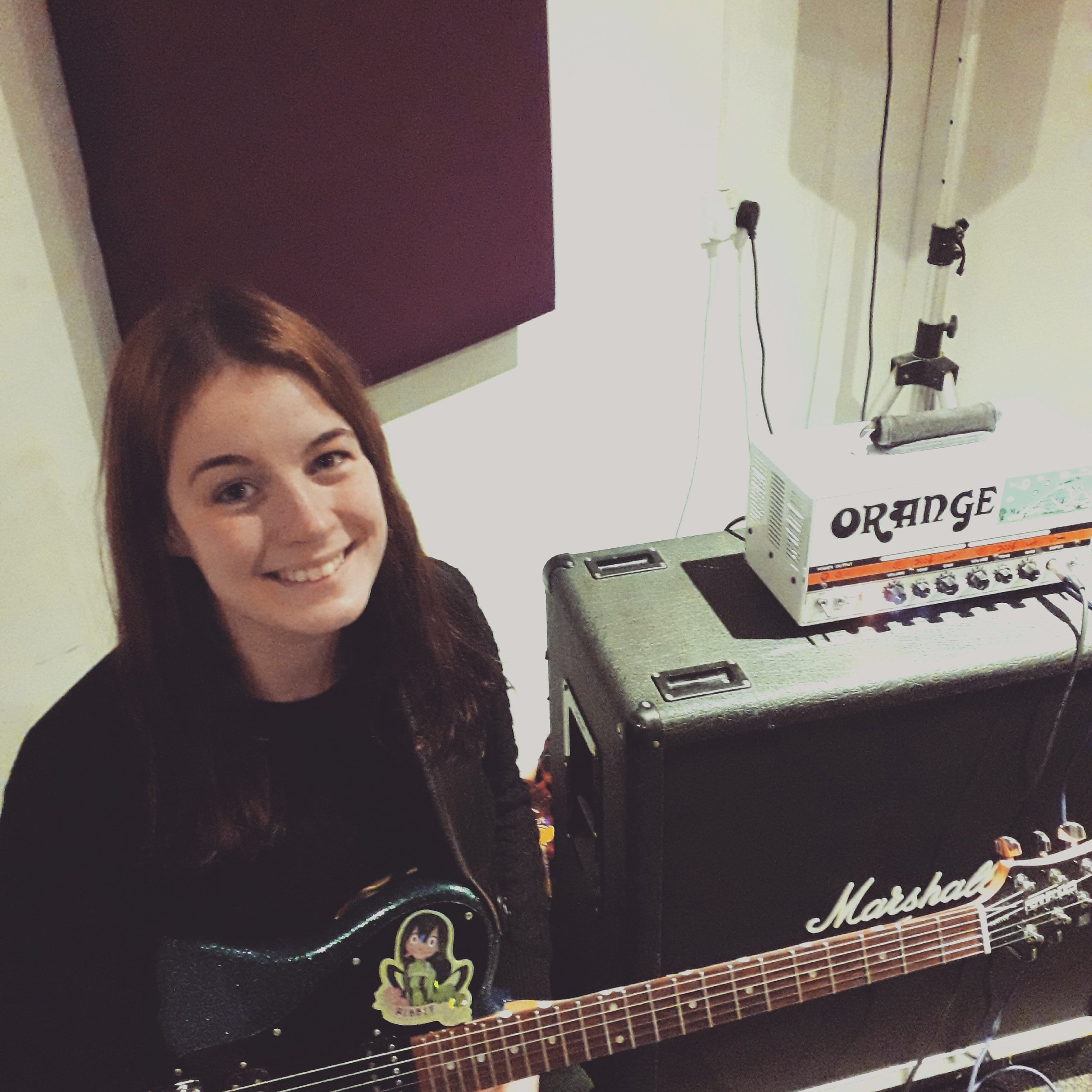The Guest: Serena Cherry (Svalbard, Terrorizer) - Is 50/50 the answer?
When I saw Svalbard live (twice!!) at Tunghørt in Stavanger I was lost for words. That seldom happens, mind you. Before the band left I summoned up the courage to talk to them, and I got to say how awesome the gig and the band was before I went back to the safety of my beer. A couple of days later I sent the band a message asking for Serena to be a part of my guest-series, and here we are!
Small introduction: Hej Norway! I’m Serena Cherry – writer / musician / illustrator and general metal nerd. My hobbies include riffing it up in Svalbard, going to theme parks and never reading the comments section. I also like cats. Small biographies are my downfall.
There’s something I really hate in the music industry. And that is: being asked to play a festival because I am a girl.
I get several offers from festivals, telling me they “want a band with a woman in” or are doing a “special all-girl stage” and want me to play. These bookers always make it abundantly clear: I am being requested because I am a woman. Not because of my music. My music is secondary to my gender in their eyes. To them, the songs don’t matter as much as my vagina.
But an offer’s still an offer, right? Shouldn’t I be flattered? Well…no. These offers are an insult.
This gender-fixated style of festival booking is highly detrimental – because it reduces me to my sex. My artistic output, 15 years of playing guitar, working hard to craft several albums…this all means nothing to the booker. I am not being asked to play a festival because of my merits. I am being asked because of something I have no control over. Something I have not worked hard on. I am being asked to play a festival because of a chromosome combination that happened in my mothers’ womb. It is so reductive.
My music is not defined by my gender. I am an artist. Not a “Female Artist.” I don’t need a festival booker to reluctantly offer me a sympathy pedestal just so he can claim the moral high ground. I am not here to fulfill a quota.
I therefore felt a mix of emotions in February, when KeyChanges announced a pledge to achieve a 50/50 gender balance on festival lineups by 2022. It was a response to statistics which revealed 80% of festival headliners to be male. Vanessa Read, CEO of the PRS Foundation cited that “on average, women made up just 26% of festival line-ups in the UK.”
Now clearly, there is an undisputable gender imbalance here. We’ve all seen those starkly empty festival posters online where the male bands have been Photoshopped out, leaving very few women’s names on the bill. It’s a powerful image – one that shows a severe lack of women gracing the largest stages in popular music. It is undoubtedly a problem.
However, I am not convinced that Keychanges pledge to achieve a 50/50 gender balance by 2022 is the answer to this problem of representation. It’s like fighting discrimination with positive discrimination.
Firstly, the pledge reduces the issue of gender representation in music down to simply a numbers game. It is merely a quantitative action - preoccupied with the fulfillment of quotas. It insinuates that as long as the number of women on festival line ups increases – then the problem is being solved. The campaign fails to address the qualitative root of the issue – WHY are there are less women in bands than men to begin with? WHY are women discouraged from playing rock music?
It’s the ATTITUDE towards women in music that needs to change before the numbers do. We need to challenge the long-perpetuated belief that being in a band is a masculine activity. No more discouraging young girls from playing guitar because it’s “unfeminine”. No more telling them that rocking out and expressing themselves is not proper ladylike behavior. The restrictive gender stereotypes that youngsters navigate through are harsh and unforgiving – if girls hear that “girls shouldn’t play rock music” enough times, they may start to believe it. Many girls will close off that dream before they even grow up.
Then there’s the male-gatekeeping that occurs within most subgenres of music – girls being questioned as if they can’t truly be into heavy metal, being treated as though they are unwelcome at gigs. We need to take into account how daunting it can be to enter the male-dominated sphere of rock music. With entire music scenes built on an often-unwelcoming, superior stance – it can be enough to put anyone who doesn’t fit the macho mold off. Not to mention the well-documented tirade of sexist abuse that is commonly hurled at women who do decide to pursue a career in music, against the odds. Will forcing festival line ups to be 50/50 gender split tackle the problematic attitudes towards women in music? Or will it only make the hostility worse?
You see, the 50/50 bill proposal demerits the musical output of women by making it a secondary factor in their festival offers. In these antifeminist times, indignant menists will likely accuse women of only getting on a bill because they are female, rather than because of their music. If anything, KeyChanges proposal could negatively impact the acceptance of women in music by patronizingly offering this pseudo helping-hand which some men will undoubtedly bemoan. (ie: “my band didn’t get a slot on this festival because we are all guys, but a girl got the slot instead.”)
Treating female musicians as charity cases is damaging to their hard fought-for careers. The pseudo helping-hand could spawn an othering “us vs. them” approach between male bands and female bands - because it makes the booking process seem less fair, less meritocratic. Don’t get me wrong, I’m all for equal opportunities. But I don’t think placing bands on a festival because they are women is an equal opportunity? Music is genderless. Book bands because they are good.
That said, I do admire the motivation behind KeyChanges - that if women see more women on stages they will feel represented, and encouraged, to pursue a career in music too. More women at festivals makes the dream seem more achievable to aspiring young women in the audience. Of course. We cannot deny the influential power of representation.
But, in an ideal world, a 50/50 split on a festival bill is something that should occur organically – not consciously. Which will happen in time, when the thorny attitudes towards women in music change. The only thing a booker needs to be ‘conscious’ of is a bands quality of music. Not what gender they are. Positive discrimination is still discrimination and it may lead to even more hostility.
Is KeyChanges drastic 50/50 proposal the answer to the problem of underrepresentation of female artists? I don’t think so. The last thing I want is to be offered festival slots merely because I’m a girl. Or for the festival audience to dismiss my music and say I only got on the bill because I’m a girl.
I believe the answer is to work to change the attitudes towards women in music first. There’s no point plunging women into a hostile environment of forced 50/50 gender split festivals - it’s not a nuanced enough approach. We need to take baby steps to make things better – like encouraging girls from a young age to play, and vigilantly challenging sexist behavior within music scenes. We need to make the creative environment welcoming first - or the seeds of a truly equal future will never flourish.
Serena Cherry

